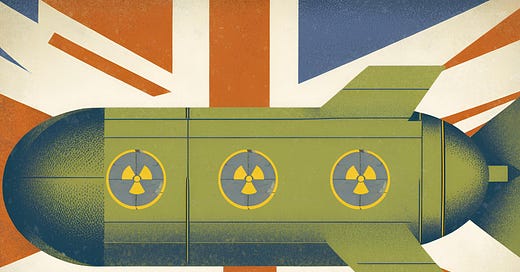
Britain holds its breath as Trump’s tariffs prove taxing on global economy
The Cable | No. 14.2025
Welcome to the 37th Cable, our weekly roundup of British foreign and defence policy.
The world is reeling from the imposition of blanket tariffs by Donald Trump, President of the United States (US). While the long-term impacts are yet to be seen, stock markets are falling and certain countries are introducing their own retaliatory tariffs on the US. Alongside the increasingly transactional and combative policies towards its allies and partners since coming to power in January, does this administration spell the end of the American-led free and open international system?
Welcome back to The Cable!
Between a rock and a hard place: Britain hit by America’s second ‘liberation day’
On Wednesday 2nd April, Trump announced reciprocal tariffs on every nation in the world as part of his so-called American ‘liberation day’. Since then, a number of America’s trading partners, including the People’s Republic of China (PRC) and the European Union (EU) have retaliated or announced plans to retaliate. As a result, global markets are in freefall. But, thanks to warm relations with the US and diplomatic action taken by Sir Keir Starmer, Prime Minister, the United Kingdom (UK) has been hit by 10% tariffs on all exports to America – a comparatively modest level compared to other major economies such as the PRC and the EU. However, with the US being Britain’s second largest trading partner, buying over £60 billion in UK products last year, these new American tariffs will cause significant economic pain, particularly at a time of anaemic growth and strained public finances.
So far, His Majesty’s (HM) Government has decided not to respond in kind, with Jonathan Reynolds, Secretary of State for Business and Trade, calling for a ‘cool-headed, pragmatic approach’ which will involve consultations with British industries before a decision on reciprocal tariffs is made. Sir Keir’s hesitancy is understandable, as a tough response could wash away months of careful diplomacy, and with it the likelihood of Trump’s continued engagement in European security affairs, while also placing negotiations for a UK-US trade deal in jeopardy.
There are also potential upsides to these tariffs, as Britain now enjoys a competitive advantage in US markets compared to most other nations. If HM Government plays its cards right, it could attract significant investment from other countries to gain preferential access to the US. Despite this potential, the mood is grim as the threat of global recession continues to rise. A potential global trade war looms, the consequences of which are almost impossible to predict. Perhaps Britain is right to wait and see how the dust settles.
Key diplomacy
On 3rd April, David Lammy, Foreign Secretary, was in Brussels for the North Atlantic Treaty Organisation (NATO) Foreign Ministers meeting, where he stated that making NATO ‘stronger, fairer and more lethal’ is key to defending Europe and promoting economic growth. Lammy went on to call for NATO nations to increase defence spending, maintain pressure on Moscow and reiterated Britain’s ‘ironclad’ support for the Alliance and for Ukraine.
Last week, it was reported that Trump has approved HM Government’s proposal to cede sovereignty of the British Indian Ocean Territory (BIOT) to Mauritius, paving the way for the deal to be confirmed after a six-month standoff. The BIOT is home to the strategically located Diego Garcia joint UK-US military base, which would have to be leased from the Mauritian government following the handover. However, details of the agreement remain vague, with Parliament yet to see a detailed plan of the proposal.
On 1st April, HM Government announced that Russia will be placed on the enhanced tier of the Foreign Influence Registration Scheme (FIRS), meaning anyone working for the Russian government in the UK will have to declare their activities in Britain or face a penalty. FIRS was introduced under the National Security Act 2023 to help protect the UK from covert, deceptive and other harmful activities. The enhanced tier focuses on particular foreign powers which pose a threat to the safety or interests of the UK. The decision to place Russia on the list comes after years of Russian covert activities taking place on British soil, most recently when three Bulgarian nationals were charged with spying for Russia in March 2025.
Adm. Sir Tony Radakin, Chief of the Defence Staff, met with his Ukrainian and French counterparts in Kyiv on 5th April to coordinate military planning of the so-called ‘coalition of the willing’. The meeting focused on how to enhance Ukraine’s military capabilities and the size and composition of a future reassurance force led by Britain and France. These talks set the stage for next week’s coalition of the willing defence ministers summit in Brussels, which will be chaired by John Healey, Secretary of State for Defence.
Defence
The Ministry of Defence (MOD) has announced plans for two new defence partnerships:
The Defence Science and Technology Laboratory (Dstl) and Defence Science and Technology (DST) Group Australia have announced a new partnership to develop next-generation sub-systems for low-cost weapons systems. This programme aims to accelerate the development and deployment of advanced, yet affordable, weapons technologies. These will include low-cost seekers (sensors which are responsible for detecting and tracking targets), additively manufactured engines (created by 3D printing or similar), modular warheads and fuses, and algorithms to improve guidance, navigation and control.
On 2nd April, Healey held a meeting with venture capital firms focused on incentivising private financing of defence and advanced technologies, with the aim of creating a new partnership between public and private defence organisations. At the event, Healey stated that defence was an ‘ethical investment’ and that:
‘In this new era of rising threats, national security isn’t just a military imperative. It’s the foundation for economic growth [and] securing Britain’s future.’
British media has reported that HM Government is in talks with Brazil over the potential sale of the Royal Navy’s recently decommissioned amphibious assault ships, HMS Bulwark – which has only just received an extensive refit - and HMS Albion. The Royal Navy has not confirmed that the deal is taking place, but it appears as though negotiations are advancing rapidly.
On 7th April, the Royal Air Force (RAF), alongside the Swedish Air Force, officially embarked on NATO’s Operation CHESSMAN to protect Polish airspace, as part of the Alliance’s Enhanced Air Policing mission. This is the first time that Sweden has operated under NATO command since joining the Alliance in 2024. Last year, RAF fighter jets took part in an Enhanced Air Policing mission in Romania.
Over the weekend, a joint UK-US scientific team led by the Defence Science and Technology Laboratory (Dstl) and the US Air Force Research Laboratory (AFRL), supported by industry partners, announced the successful completion of a major hypersonic propulsion test. The team carried out 233 tests over a six-week period to refine aspects of engine design for future hypersonic missile capabilities, resulting in advances in performance. The team was successful in demonstrating the performance of the high-speed air-breathing engine, which will enable greater ranges than a conventional rocket propulsion. For further details on Britain’s hypersonic missile programme, see the Council on Geostrategy’s Policy Paper from September 2024.
Environment and climate
HM Government has announced a £20 million investment into ‘Starmaker One’, the world’s first government partnership with a fusion private venture capital fund. This new public-private partnership scheme is aimed at supporting fusion businesses and start-ups to grow and commercialise at scale. The injection of public funds is expected to draw in private finance worth £100 million for the British economy.
The National Energy System Operator (NESO) announced that on 1st April, the UK generated a new maximum solar generation record of 12.2 Gigawatts (GW). Increasing solar panel installation and good weather led to the new record, which is expected to be broken in the coming weeks and months.
How Britain is seen overseas
The Atlantic Council published an article on Britain’s leading role in boosting support for Ukraine following the change in administration in America. The article highlights the UK’s role as one of Kyiv’s staunchest supporters since Russia’s full-scale invasion in February 2022, which has strengthened Britain’s global prestige. With the development of a coalition of the willing, the author states that UK-Ukraine relations will continue to deepen, which will also place Britain at the heart of any new European security architecture which evolves out of the current transformation of US policy towards NATO and Europe.
How competitors frame Britain
Last week, Russia Today fell for an April Fools’ satirical article released by the UK Defence Journal which proclaimed that the Royal Navy was planning to build a third Queen Elizabeth class aircraft carrier – the HMS Prince Andrew – at the cost of £987.6 billion complete with ‘go-faster stripes on the hull “to improve speed and morale”’. While Russia Today has since removed the article from its website, the spectacle confirms the outlet has problems with quality control.
Following the announcement that Russia will be added to FIRS, Sputnik International released propaganda stating that the decision was ‘designed to distract ordinary Britons’ from domestic economic troubles. The article quotes a spokesperson for the Russian Embassy to the UK, who called the scheme ‘another discriminatory barrier to the long-term restoration of Russian-British relations…erected out of thin air.’ It appears as though the Kremlin wants to play victim, despite years of covert actions on British soil and its ongoing attempts to suppress Ukraine.
How effective are tariffs as a way to wield power?
For Trump and others, tariff is a ‘beautiful’ word, for many other nations, multinationals and economists, it is a ‘dirty’ word. The use of tariffs historically has been ubiquitous, including in the UK and the US, but in the post-1945 era of significant institutionalised trade liberalisation, tariffs have not really been used by major countries to wield power, being used more as a shield for economic development and as protection for particular sectors or industries.
Under Trump, the US application of generalised tariffs and so-called ‘reciprocal’ tariffs marks a quite different usage. He says they will raise revenues and be used as leverage, but the main organising function is to get states to change their behaviour.
While the Adam Smith-cum-Economics 101 case against tariffs is solid, the political economy case in 2025 is different. Trump’s tariffs are intended to break up the PRC-centric supply chains and trans-shipment of goods via third countries which have become features over the last 25 years, and which Beijing has exploited to the full. Trump wants to hit the PRC, and vice versa, but his aim is to get other countries to negotiate more US-friendly, less Beijing-friendly trade arrangements in exchange for lower tariffs, and encourage firms to build and invest in the US.
Tariffs will be ineffective either if the US domestic economic consequences are so harsh as to drain voter support, or if America’s allies abandon cooperation and negotiation with the US.
Britain is in the lowest tariff category – 10% – and HM Government is considering its response. Given its relative size and economic heft, most economists judge that the UK’s national interests are best served by skirmishing with the US on tariffs if necessary, but trying to reach better trade relations overall. The EU, with an economy comparable in size to the US, is in a stronger position to hit back, but Brussels is more likely to want to manage tariff spats than throw the collective economic weight of the member states around in pique. Some countries, such as Indonesia, Taiwan, Vietnam and Israel, seem willing to negotiate, or stand pat.
Tariffs are an inappropriate way to exercise power, but there is no viable forum for global trade reform, and global trade imbalances are unsustainable. One way or another, either through American tariffs or Chinese dumping of exports, the world will have to pay to address them. This is just the opening salvo.
If you found this Cable useful, please subscribe or pledge your support!
What do you think about this Cable? Why not leave a comment below?

















Really excellent piece! Thanks a bunch for putting this together. It’s sound analysis, clearly laid out, and genuinely easy to digest without losing the nuance. One of the more thoughtful breakdowns I’ve read on this.
I’d just add that while the headline figure (£60 billion in UK exports to the US) sounds dramatic, the first-round effects of a 10% tariff might not be too severe. A big chunk of that total includes goods that aren’t very price-sensitive such as luxury cars (Jaguar, Bentley, Rolls, etc.), high-end pharmaceuticals, and specialist manufactured goods (think jet engines). These markets tend to be driven more by reputation and long-term contracts than marginal pricing shifts.
The real risk comes in the second-round effects, particularly from the fall in derived demand if countries hit harder by US tariffs (like the EU and PRC) start spending less. That’s where the economic drag might bite.
That said, I think the UK may actually find an opportunity at this moment. There’s potential for third-party countries to use UK ports as re-export routes to the US (though the US would surely try to clamp down on that in the medium to longer-term). More realistically, we could see third-country firms boost manufacturing in the UK to access the US more easily. There’s precedent for this (just look at how Vietnam and Mexico capitalised during the last round of US-China trade tensions).
So yes, blanket tariffs are a terrible step in global economic terms- but economics is all about relative advantage. And right now, we might have the strongest relative position among medium-to-large economies that are (or were) close US partners. If the UK plays it right (keeping Trump sweet while quietly luring foreign firms) there’s room to manoeuvre!